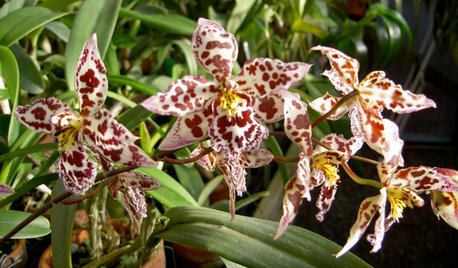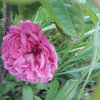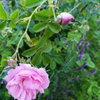Osmocote
What is wrong with using Osmocote on my roses? I am always running behind, and have had so much trouble with the weather since last winter. I only have about 150 roses anymore, but I am overwhelmed with work to do in the yard. I keep thinking that compost, etc would be better, but many of my roses have been terribly stressed by the winter, and need help.
I am totally against pesticides for me personally to use, but what harm can come to my garden by using a chemical like Osmocote instead of Mills Magic or something that is "time consuming" when I don't have time.
I hope I am making sense, since I need to get to work.
Thanks,
Sammy
Comments (15)
mike_rivers
12 years agoI'm not sure what's bothering you about using a synthetic fertilizer such as Osmocote but for what it's worth:
1) Osmocote and Mill's Magic are both chemicals, 100%.
2) Osmocote and Mill's Magic both enter the plant in the same chemical form.
3) A major problem with most synthetic fertilizers is that they supply more nutrients than a plant can use at a given time and the excess is easily lost by leaching. Osmocote's slow release coating largely solves this problem.
4) If you are concerned with the wise use of our resources, I suspect that the production and distribution of Mill's Magic consumes more resources compared to Osmocote.
dublinbay z6 (KS)
12 years agoI'm glad to hear Mike's common sense assessment--since I have been using Osmocote for several years now. Previous years I used Rose-tone for the first spring feeding--I like some of those "extras" in it, like alfalfa--and then I used the 3-month Osmocote for the late-May through August feedings. That way I didn't have to go out on a very hot July or August day and do more feedings.
Two things about Osmocote--neither of which is "scientific" but merely my personal impression. Osmocote seemed to jump into action much more quickly than Rose-Tone did, so maybe it is good for encouraging quicker re-bloom?
There does seem to be a period during the later part of the Osmocote cycle when the roses seem to need a little extra booster shot--they seem to temporarily stall out or slow down on growing. But then it passes--and I'm usually too lazy (or its too hot out) to give them a booster, but it has occurred to me that a Miracle Grow liquid "shot" might be helpful.
This year I screwed it up--too busy this spring to get around to the first early feeding. Guess what--roses didn't care. They bloomed as good as, maybe even better than, they did every other year. Makes me wonder if we sometimes unduly fuss over our roses. My problem now is that I need to start the summer feeds, and I can't decide whether to use the Osmocote as usual or, since I already bought the Rose-Tone, go ahead with monthly summer feedings of it. I guess I could treat it as an experiment and see what the long-term differences in blooming are.
150 roses--I guess you are busy! I say, do whatever works best for your schedule and priorities. You'll still get some beautiful roses out of it.
By the way, do check the time-length for those continuous-feed products like Osmocote. Some of those products are for 6 months, some 4 months, some 3 months. I don't think you probably want the roses still being actively fed in September or October.
Kate
Related Professionals
Clearlake Landscape Contractors · La Vista Landscape Contractors · Mendota Heights Landscape Contractors · North Highlands Landscape Contractors · North Lauderdale Landscape Contractors · Riverhead Landscape Contractors · Lauderdale Lakes Landscape Contractors · Palos Heights Landscape Contractors · Cedar Park Siding & Exteriors · Cherry Hill Siding & Exteriors · Longmont Siding & Exteriors · Newington Siding & Exteriors · Overland Park Siding & Exteriors · Rockford Siding & Exteriors · North Richland Hills Siding & Exteriorstaoseeker
12 years agoOsmocote is not bad at all, but in the long run I know the soil benefits from organics. It depends on the strategy you have chosen for your garden, and it doesn't have to be all organic. Any organic pellet-form fertilizer would be just as easy to use as osmocote, but osmocote will act faster. Both need some rain or watering to work. All in all, go for the osmocote ;-)
Best of luck !
jacqueline9CA
12 years agoI have been using Osmocote for decades. I throw it around the roses maybe once a year (I buy the 9 month kind from Amazon), then I cover it with maybe 2-3 inches of mulch, then I put some sort of "weed seed prevent" product on top of the mulch, and water in. My main theory is that since I am very lazy, I can do this all at once, and the Osmocote will hopefully provide the nitrogen used up as the mulch deteriorates.
Jackie
mike_rivers
12 years agoSome more thoughts:
150 roses - whew! I have 50 and that's about all I can handle - course I am pushing 70.
My fertilizer schedule for the year starts and ends on two days in early Spring, shortly after pruning. I pull back the mulch to clear a 1 ft circle around the rose, sprinkle with Osmocote (one with iron and other minors), sprinkle over that with 1 cup of alfalfa pellets, then sprinkle everything with water for maybe a minute per rose to wet down the alfalfa. On the second day, the alfalfa pellets have absorbed the water and turned to a fluffy substance which, together with the Osmocote, I work into the 1 ft circle of soil using mostly my hands, and that's pretty much it for the year. I do repeat the alfalfa treatment maybe a month or two later with some of the roses and, of course, there's always some fooling around with whatever magic fish oil or whatnot strikes my fancy.
diane_nj 6b/7a
12 years agoI use both Osmocote and Espoma Rose-tone (not on the same plants). I don't find the application of Osmocote any less time consuming than applying the Rose-tone, but then, I don't do anything more than throw them around the plant (I don't scratch or dig in, I don't move mulch).
sammy zone 7 Tulsa
Original Author12 years agoThank you so much. I want to take care of my property and have stopped all pesticides. For me this has worked well, and I now have roses that grow well in a spray free garden.
I don't know what is damaging to the environment, and what is harmless. In my opinion the pesticides were not accomplishing what I wanted, so I stopped them.
Now as I look at Osmocote, I wonder why I should not use it -- it is a chemical, but what harm is done by using it. It does not build the soil, but does every product have to build? Is it wrong to pour in a chemical? So, what is a chemical? What is bad and good?
I teach Spanish, and have suddenly become older than I think. I don't want to be a chemist, and do not want to really understand bad from good, but want to be healthy, and do not want to harm my garden or environment.
Mike, what you say makes a lot of sense to me. I have considered Osmocote a chemical (so it must be bad), and Mills Magic is natural, so it must be good.
I need perspective. I need to take care of my roses, but the thought of putting Mills Magic around all of those roses is overwhelming. I will toss the Osmocote, and feel good about it.
Thanks to everyone.
Sammy
mike_rivers
12 years agoSammy, I think most of us want to garden in a way that is environmentally responsible. Exactly how to do that - or even to say what that means - is a problem. I suspect that avoing most modern pesticides is a necessary part of the solution but using only natural fertilizers and never synthetic ones, is not.
User
12 years agohi Sammy, just letting you know that Osmacoate is generally the fertiliser of choice for just about all the nurseries, horticulture schools and large public gardens I can think of, for the precise reasons you stated - it saves time, is wonderfully efficient (it is responsive to heat and as the season warms up, the outer coat breaks down to release nutrients slowly but regularly - in my opinion, much better than a huge meal every few weeks. True, it does not add substance (humus) to the soil but it certainly works as an all-round general fertiliser and is especially brilliant in containers.
landperson
12 years agoOh Sammy, I'm glad you asked this. As soon as I finished reading through the post before this one I jumped in my car and headed for the nearest suppler and bought a 10# sack of Osmocote 14-14-14. I came home, raced around the house and dispensed most of the bag.....scoop by scoop. Whoopee....
Susan
lagomorphmom
12 years agoTaoseeker raises an interesting point for me since I have drip irrigation - gotta water it to dissolve it. I know that, but good to say it again.
Second, I think a good observation regarding Osmocote vs 'organics' is that the Osmocote is feeding your roses specifically, while organics are more about feeding your soil, which will eventually feed your roses. Ideally, they both get fed, it's just a matter of how you get it done.
bugbite
12 years agoWhen the temperature reaches 90+ Osmocote may only feed 1 month, not 3-4 months. Read their spec sheet below. Very inconsistant fertilizing. I just bought 20 pounds and think I will it and order Jack's ( formally Peter's)and use a siphon.
Here is a link that might be useful: Osmocote
michaelg
12 years agobugbite, that chart refers to soil temperature rather than air temperature and soil temperature averaged over the weeks. So for mulched garden soil in Florida during the summer the average temperature might be around 80 degrees--perhaps less given the daily thunderstorms. But you could check the temperature 3" deep with a thermometer.
Osmocote makes (or used to make) a product designed to work for 3 months in Florida.
Release of nitrogen from organic sources will also speed up or slow down according to temperature.












taoseeker